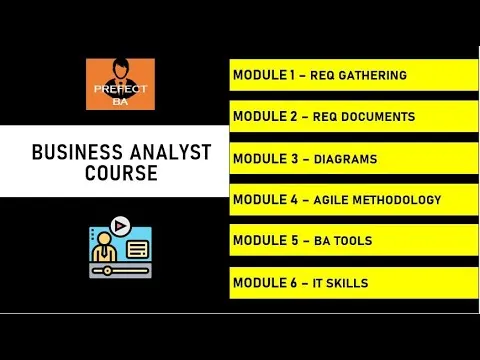
Business Analytics for Beginners 
This Business Analyst Tutorial For Beginners is a must-watch video for everyone who wishes to learn business analytics and make a career in it. In this course, you will learn what is business analysis, the Business Analytics process, the difference between business analysts and data analysts, Top tools in business analytics, various roles of business analysts in the organization, Risk management, CBAP Certification, and what are the top business analyst skills required in the organization. Additionally, you will also learn about business analyst interview questions. This course is perfect for those who are just starting out in the field of business analytics and want to gain a better understanding of the fundamentals. ▼
ADVERTISEMENT
Course Feature
![]() Cost:
Cost:
Free
![]() Provider:
Provider:
Youtube
![]() Certificate:
Certificate:
No Information
![]() Language:
Language:
English
![]() Start Date:
Start Date:
Self Paced
Course Overview
❗The content presented here is sourced directly from Youtube platform. For comprehensive course details, including enrollment information, simply click on the 'Go to class' link on our website.
Updated in [May 17th, 2023]
This course, Business Analytics for Beginners, provides an overview of the field of business analytics. It covers topics such as what is business analysis, the Business Analytics process, the difference between business analysts and data analysts, Top tools in business analytics, various roles of business analysts in the organization, Risk management, CBAP Certification, and what are the top business analyst skills required in the organization, and lastly business analyst interview questions. This course is designed to provide a comprehensive introduction to the field of business analytics and is ideal for those who wish to learn more about the subject and make a career in it.
[Applications]
The application of this course can be seen in various areas of business. Business analysts can use the knowledge gained from this course to help organizations make better decisions and improve their operations. They can use the skills learned to identify areas of improvement, develop strategies, and create solutions to problems. Additionally, they can use the tools and techniques discussed to analyze data and create reports. Finally, the course can also be used to prepare for a business analyst interview, as it covers the skills and questions that may be asked.
[Career Paths]
1. Business Analyst: Business Analysts are responsible for gathering and analyzing data to identify trends and opportunities for improvement in an organization. They use their knowledge of business processes and data analysis techniques to develop solutions that help organizations become more efficient and profitable. Developing trends in this field include the use of artificial intelligence and machine learning to automate data analysis and the use of predictive analytics to anticipate customer needs.
2. Data Scientist: Data Scientists are responsible for collecting, analyzing, and interpreting large amounts of data to uncover insights and trends. They use their knowledge of statistics, mathematics, and computer science to develop algorithms and models that can be used to make predictions and decisions. Developing trends in this field include the use of natural language processing and deep learning to analyze unstructured data and the use of big data to uncover insights from large datasets.
3. Business Intelligence Analyst: Business Intelligence Analysts are responsible for designing and implementing data-driven solutions to help organizations make better decisions. They use their knowledge of data analysis, data visualization, and data mining to develop reports and dashboards that provide insights into an organization’s performance. Developing trends in this field include the use of self-service analytics tools to enable users to explore data on their own and the use of predictive analytics to anticipate customer needs.
4. Data Architect: Data Architects are responsible for designing and implementing data systems that are secure, efficient, and scalable. They use their knowledge of database design, data modeling, and data warehousing to develop data architectures that meet an organization’s needs. Developing trends in this field include the use of cloud computing to store and process data and the use of NoSQL databases to store unstructured data.
[Education Paths]
1. Bachelor of Science in Business Analytics: This degree program provides students with the skills and knowledge to analyze data and develop strategies to improve business operations. Students learn to use data-driven decision-making to identify trends, develop predictive models, and create actionable insights. The degree also covers topics such as data mining, machine learning, and artificial intelligence. This degree is becoming increasingly popular as businesses look to leverage data to gain a competitive edge.
2. Master of Science in Business Analytics: This degree program provides students with advanced skills in data analysis and business intelligence. Students learn to use data to identify trends, develop predictive models, and create actionable insights. The degree also covers topics such as data mining, machine learning, and artificial intelligence. This degree is becoming increasingly popular as businesses look to leverage data to gain a competitive edge.
3. Master of Business Administration in Business Analytics: This degree program provides students with the skills and knowledge to analyze data and develop strategies to improve business operations. Students learn to use data-driven decision-making to identify trends, develop predictive models, and create actionable insights. The degree also covers topics such as data mining, machine learning, and artificial intelligence. This degree is becoming increasingly popular as businesses look to leverage data to gain a competitive edge.
4. Doctor of Philosophy in Business Analytics: This degree program provides students with the skills and knowledge to analyze data and develop strategies to improve business operations. Students learn to use data-driven decision-making to identify trends, develop predictive models, and create actionable insights. The degree also covers topics such as data mining, machine learning, and artificial intelligence. This degree is becoming increasingly popular as businesses look to leverage data to gain a competitive edge.
Course Provider

Provider Youtube's Stats at AZClass
Discussion and Reviews
0.0 (Based on 0 reviews)
Explore Similar Online Courses

SEO Fundamentals Course with Greg Gifford

The Construction Industry: The Way Forward

Python for Informatics: Exploring Information

Social Network Analysis

Introduction to Systematic Review and Meta-Analysis

The Analytics Edge

DCO042 - Python For Informatics

Causal Diagrams: Draw Your Assumptions Before Your Conclusions

Whole genome sequencing of bacterial genomes - tools and applications

Business Analyst Full Course In 2 Hours Business Analyst Training For Beginners Simplilearn

Business Analyst Training for Beginners Business Analysis Tutorial Invensis Learning


Start your review of Business Analytics for Beginners